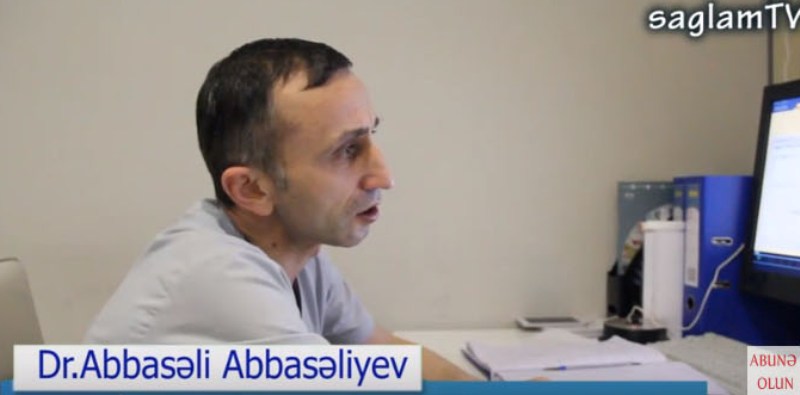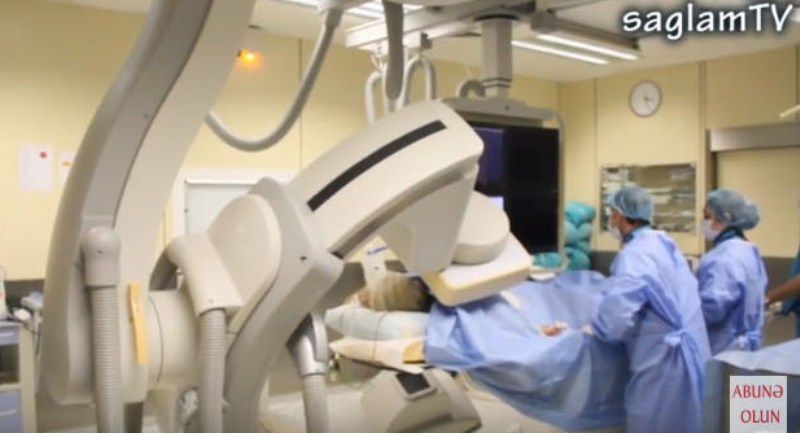Abbasali Abbasaliyev – doctor cardiologist, the first local specialist in Azerbaijan in the field of angiography and stent operations, in other words in invasive cardiology. Head of the Department of Cardiology of the Republican Diagnostic Center, member of the Board of the Azerbaijan Cardiology Society, candidate of medical sciences. Awarded with Taraggi medal by the decree of the President Ilham Aliyev dated 14.11.2016.
Biography
Abbasali Abbasaliyev was born on April 22, 1970.
After successfully completing secondary school, he continued his medical education in Turkey under a contract with the fraternal country Turkey.
Between 1991 and 1997, he studied at the Medical Faculty of the Dokuz Eylul University in Izmir, Turkey.
In 1997-2001, getting the postgraduate program in the Cardiology Department in the Aegean University of Izmir, he defended his scientific work and received the title of cardiologist.
He worked at the Atakalb Cardiac Diseases Hospital in Izmir between 2001 and 2003.
Professional experience
From April 2003 to the corresponding period of 2006, he worked as a Head of Cardiology Department at the Central Clinical Hospital in Baku.
In the 2000s, cardiology in Azerbaijan was entering a new stage of development as it is in the whole world. During these years, it was started by Turkish specialists in our country to carry out the coronary angiographic examination and the operations of opening of coronary artery lesion by stent. Dr. Abbasali Abbasaliyev became the first local – Azerbaijani specialist performing in such operations in Azerbaijan. Since 2003, he has begun to conduct the coronary angiography and stent operations at the Central Clinic Hospital.
Along with angiography and stent interventions, diagnosis and treatment of all heart diseases including the non-invasive interventions and heart failure, hypertension, coronary heart disease, atherosclerosis and other diseases are his key areas in medicine as a cardiologist. As one of the leading experts in the development of invasive cardiology in Azerbaijan, he takes part in the training of new cadres and actively attends the international cardiology conferences.
Invasive cardiology
Invasive cardiology is considered the greatest achievement of modern cardiology. Invasive cardiology covers a wide and important area, including diagnosis named coronary angiography and stenting. This area of medicine has gone a long way until it achieved the present stage of development. Coronary angiography is an examination system most recently used in the world that shows the state of the cardiac arteries. There should be indications for coronary angiography. If a patient has had a coronary thrombosis or referred to a doctor with complaints called stenacardia, such as aching, burning, pain on the chest area during movement, coronary artery image is taken by coronary angiography and a place of stenosis is detected. There are severe and non-severe stenoses in the arteries. When the coronary arteries stenoses create danger for human life and there is a risk of heart attack, stent surgery is performed to open these obstructed arteries. If the artery stenosis is more than 70%, it is considered a dangerous stenosis for the patients. The stenoses more than 70% give complaints to the patients during movement. But if it is less than 70%, it does not give pain to the patients even if he is in movement, and we continue to treat it with medication. If in a coronary angiography we find that the stenosis is 70% and more, we conduct the stent operation before a patient has a heart attack as it is dangerous for the future life of the patient and has a risk of heart attack. Stent is a process of opening the heart arteries by entering from artery without the invasive ways – the open surgeries. The stent operation has been used in medicine for many years and is the latest innovation in medicine.
If the stent is performed in time, the quality of the patient’s life will be normal. Stents are divided into two major groups, being medicinal and non-medicinal. As for metals, both of them are made of known metals. Medicinal stents are injected with special drugs and this will greatly reduce the risk of restenosis in the future. There is no drug on the non-medicinal stents. There is a greater risk of obstruction in the non-medicinal stents than in the medicinal stents. If the risk of re-obstruction in the medicinal stents is 3-5%, this risk is higher in the non-medicinal stents.
The location and size of the artery is important here. There is no difference between the medicinal and the non-medicinal stents, if the size and diameter of the artery is as large as possible, and its length is as short as possible.
The smaller the size and the diameter of the artery, and the shorter the length, the risk of obstruction is less, even if the stent is a non-medicinal stent. We perform this procedure by entering from the arterial vessels. Usually the operation is carried out by entering from inguinal and femoral artery and pin artery. The principal difference between them is convenience of the arm vessels for comfort the patients. And it reduces the risk of bleeding in elderly patients. This risk is not so great, as the arm vessels are fine.
Intervension cardiology, in other words, invasive cardiology is not just angiography and stent interference.
It also includes a number of congenital heart defects (Pulmonary valve stenosis, atrial septal defect (ASD), patent ductus arteriosus (PDA), Aortic coarctation). Invasive cardiology also includes permanent pacemaker (heart battery), ICD, CRT devices implantation, and transcatheter aortic valve implantation (TAVI) in the cardiac rhythm problems.
He has worked as a Head of Division of Intervension Cardiology (Invasive Cardiology) at the Central Oil Workers’ Hospital since 2006-2017
At the moment , Since March 2017 the cardiologist, Dr. Abbasali Abbasaliyev is a Head of Cardiology Department of the Republican Treatment and Diagnostics Center.
Contact tel: (+994) 050-208-28-26
Tehe history of Intervension cardiology Angiography and stent İntervention in Azerbaijan
Put 5 stents in one session. Invasive cardiologist Abbaseli Abbaseliyev
First local specialist in conducting angiography and stenting in Azerbaijan
Facebook Comments



